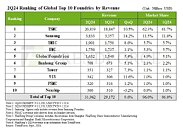- Joined
- May 21, 2024
- Messages
- 1,527 (3.58/day)
Samsung's foundry plans have again hit a major setback. The company notified staff at its Taylor, Texas facility that it was temporarily removing workers from the site because it is still experiencing challenges with 2 nm semiconductor yields, delaying mass production timelines from late 2024 to 2026. The Taylor site had been anticipated as the flagship facility for Samsung's sub-4 nm production, allowing access to potential customers near the facility. While Samsung has moved rapidly in terms of process development, its yields for advanced nodes have outstripped them, the company's yields for sub-3 nm processes hover around 50%, with Gate-All-Around (GAA) technology witnessing yields of only 10-20%, significantly lower than neighboring competitor TSMC's 60-70% for corresponding nodes.
The yield gaps that the company is experiencing have exacerbated the gap in market share, with TSMC capturing 62.3% of the global foundry market share in Q2 versus Samsung's 11.5%. The company is struggling to gain share despite efforts by Chairman Lee Jae-yong - including visits to component suppliers ASML, and Zeiss - and these yields put at risk as much as 9 trillion won in U.S. CHIP Act potential subsidies that are dependent upon operational milestones.


View at TechPowerUp Main Site | Source
The yield gaps that the company is experiencing have exacerbated the gap in market share, with TSMC capturing 62.3% of the global foundry market share in Q2 versus Samsung's 11.5%. The company is struggling to gain share despite efforts by Chairman Lee Jae-yong - including visits to component suppliers ASML, and Zeiss - and these yields put at risk as much as 9 trillion won in U.S. CHIP Act potential subsidies that are dependent upon operational milestones.


View at TechPowerUp Main Site | Source




